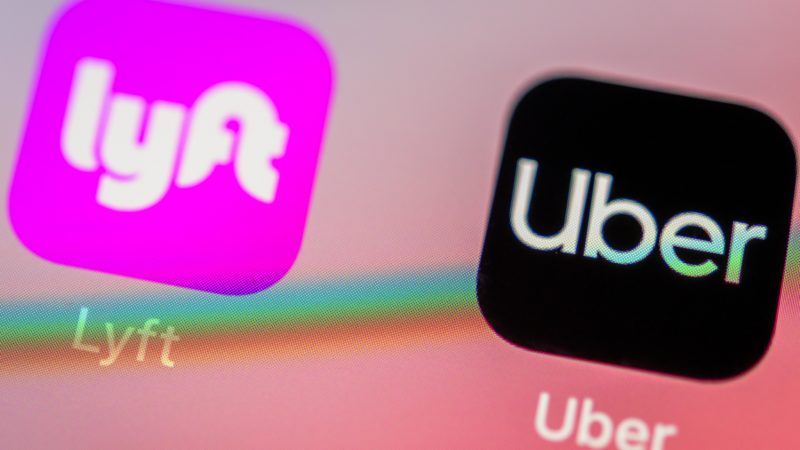California's Proposition 22 Pits the Future Against Its Enemies
The ballot initiative would allow companies such as Uber, Lyft, and DoorDash to classify workers as independent contractors rather than as permanent employees.

More than two decades ago, Virginia Postrel published a prescient book with a wonderful title: "The Future and Its Enemies." The technological revolution that has led to "greater wealth, health, opportunity and choice than at any time in history," she argued, has resulted in "a chorus of intellectuals and politicians [that] loudly laments our condition."
Sadly, the future's enemies use the government to fight inevitable innovation and progress.
These critics bemoan the economic insecurity such advances have wrought, as well as other first-world problems ranging from our "enslavement" to technology to the supposed (but not actual) despoliation of the Earth. When she published the book, "smart phones" were rather dull. They were large, clunky, and served solely to make phone calls. It's inconceivable how far those—and other common products—have developed in the ensuing years.
I recall my prized eight-track tape player, my first car with its whopping 70 horsepower and AM-only radio, phone booths, library card catalogs, pneumatic tubes for delivering office documents (Google it), video stores, and, my favorite, Qwip machines. The latter was cutting-edge in the 1970s. The sender put a document on a cylinder that would spin. It slowly transmitted a facsimile of the document—line by line and in crude fashion—to carbon paper at the other end.
Today I scanned and emailed dozens of documents and shudder at the thought of doing things in that archaic manner. By the way, it's easy to get caught up in the consumer-oriented improvements we cherish while forgetting about, say, the vast improvements in food production that have dramatically reduced world hunger and the many life-saving medical advancements.
In California this year, the fight over the future centers on Proposition 22, which would allow companies such as Uber, Lyft, and DoorDash to classify workers as independent contractors rather than as permanent employees. Obviously, technology has disrupted the way we travel, shop, and work, which has made our lives much better—but has infuriated labor unions, which find it tougher to organize workers in the flexible new work world.
I've noted this before, but they've clearly taken on the role of the 19th Century British Luddites—textile workers who couldn't compete with mechanized looms, so they vandalized them. Modern unions don't destroy property these days—but they lobby the government to do something worse. They try to hobble those industries that are moving the world forward.
A few weeks ago, I took a taxicab for the first time in months. The driver didn't want my business because, apparently, it wasn't a good-enough fare. The cab was grimy. He balked at my credit card, and it took time to process it after I insisted. Compare that to the friendly and seamless experiences we have with Uber and Lyft. Think about the deliveries we receive—and how they allow us to avoid those laborious trips to box stores and restaurants.
Proposition 22 is a reaction to Assembly Bill 5, which went into effect in January. The law, signed by Gov. Gavin Newsom and championed by unions, codified a 2018 California Supreme Court decision (Dynamex) that applied a strict test to companies that want to hire freelancers. The measure would exempt drivers from A.B. 5's provisions—and provide them with some portable benefits.
After A.B. 5 became law, it had vast should-have-been-seen consequences. Instead of bringing workers onboard full-time and paying them benefits, companies started laying off their California contractors. Californians who had good jobs but used freelance and contractor work to earn some side income had to give up their lucrative gigs. Consumers suffered, too, as they endured rising prices and fewer choices—all in the midst of a pandemic.
That's why even the union-controlled California Legislature exempted more than 100 industries from A.B. 5's strict provisions. They exempted almost every major industry, except for those increasingly vital transportation and delivery services.
If voters approve Proposition 22, the state will have a groundbreaking labor law that applies to virtually no one, yet that hasn't stopped the labor movement from touting it as a nationwide model. If California voters approve it, they will slow this new Luddite movement from spreading.
Unions can't stop the future, but they can cause misery as we await its arrival. For instance, our union-allied attorney general, Xavier Becerra, has filed lawsuits against the transportation companies to force them to comply with A.B. 5 as we await the election. The companies were hours away from suspending operations here until a court issued a temporary stay. This is nonsensical in a state that sees itself as the embodiment of progress.
Even if labor wins at the polls this November, it will have no more long-term success than any other group that has tried to fight a changing world. Like water rolling down a hill, creative minds will find their way around every obstacle. Sorry, but the union vision of factory floors and cubicles is a vestige of the past—not a roadmap to the future.
This column was first published in The Orange County Register.



Show Comments (45)